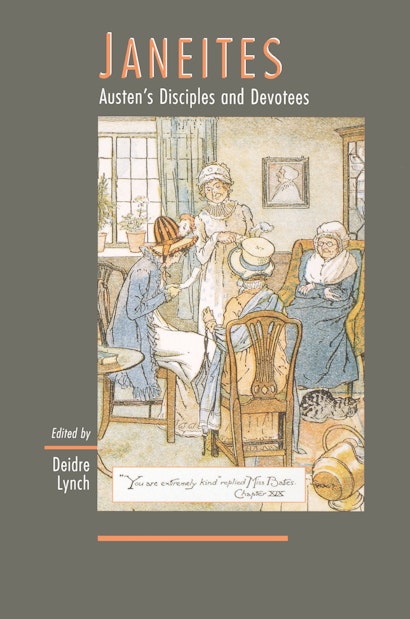Over the last decade, as Jane Austen has moved center-stage in our culture, onto best-seller lists and into movie houses, another figure has slipped into the spotlight alongside her. This is the “Janeite,” the zealous reader and fan whose devotion to the novels has been frequently invoked and often derided by the critical establishment. Jane Austen has long been considered part of a great literary tradition, even legitimizing the academic study of novels. However, the Janeite phenomenon has not until now aroused the curiosity of scholars interested in the politics of culture. Rather than lament the fact that Austen today shares the headlines with her readers, the contributors to this collection inquire into why this is the case, ask what Janeites do, and explore the myriad appropriations of Austen—adaptations, reviews, rewritings, and appreciations—that have been produced since her lifetime.
The articles move from the nineteenth-century lending library to the modern cineplex and discuss how novelists as diverse as Cooper, Woolf, James, and Kipling have claimed or repudiated their Austenian inheritance. As case studies in reception history, they pose new questions of long-loved novels—as well as new questions about Austen’s relation to Englishness, about the boundaries between elite and popular cultures and amateur and professional readerships, and about the cultural work performed by the realist novel and the marriage plot.
The contributors are Barbara M. Benedict, Mary A. Favret, Susan Fraiman, William Galperin, Claudia L. Johnson, Deidre Lynch, Mary Ann O’Farrell, Roger Sales, Katie Trumpener, and Clara Tuite.
Deidre Lynch is Associate Professor of English at the State University of New York at Buffalo. She is the author of The Economy of Character: Novels, Market Culture, and the Business of Inner Meaning and the coeditor, with William B. Warner, of Cultural Institutions of the Novel.
"Written with much scholarly dedication and good humor . . . Accessible, well documented, carefully written generally argot-free, and convincing."—Choice
"Although Janeites is written by professionals and thus, perhaps, is not for every amateur enthusiast, anyone who can read Jane Austen's sophisticated prose will be able to read these essays."—James R. Aubrey, Bloomsbury Review
"Janeites is a groundbreaking book."—Devoney Looser, Eighteenth-Century Studies
"Lynch . . . reveals how [Austen] has inspired a wide range of readers, from those seeking a friend to those searching for relief from the horrors of war. . . . [The book is] illuminating and scrupulously researched: readers will be pleased to see a picture of the eighteenth and nineteenth centuries brimming with women writers, artists, workers, and entrepreneurs populating and influencing the public sphere."—Jill Heydt-Stevenson, The Wordsworth Circle
"Compelling and engaging. . . . [A] significant contribution to Austen studies, and more broadly to cultural studies of the novel."—Amanda Gilroy, Novel
"A remarkably compelling and important book. The brilliance of this collection depends partly on its conception: to demonstrate that at every historical moment since the initial publication of Jane Austen's novels there have been diverse audiences that attached diverse meanings to the texts provided. In a sense, Janeites offers a cautionary tale for critics, reminding us by dramatic exemplification of the degree to which assumptions held determine significance found, and reminding us also, on occasion, of where our assumptions come from."—Patricia Meyer Spacks, University of Virginia
"Janeites illuminates the reception of Jane Austen over the past couple of centuries, discovering along the way dimensions quite foreign to the quietest Regency theme park that middlebrow culture has recently made of her. The genealogy of this domesticated Jane is examined by several of the essays, but so are those of many other Janes as well. This collection will be a significant contribution to Austen studies, and it will be important as a history of the vagaries of literary reception, a study of the ways that cultural objects are enlisted to define, differentiate, and displace class and ethnic and sexual identities."—Jeff Nunokawa, Princeton University

